Related Research Articles

Thomas Stearns Eliot was a poet, essayist and playwright. He is considered to be one of the 20th century's greatest poets, as well as a central figure in English-language Modernist poetry. His use of language, writing style, and verse structure reinvigorated English poetry. He is also noted for his critical essays, which often re-evaluated long-held cultural beliefs.

Marianne Craig Moore was an American modernist poet, critic, translator, and editor. Her poetry is noted for its formal innovation, precise diction, irony, and wit. In 1968, she was nominated for the Nobel Prize in Literature by Nobel Committee member Erik Lindegren.
This article contains information about the literary events and publications of 1770.

George Ames Plimpton was an American writer. He is known for his sports writing and for helping to found The Paris Review, as well as his patrician demeanor and accent. He was known for "participatory journalism," including accounts of his active involvement in professional sporting events, acting in a Western, performing a comedy act at Caesars Palace in Las Vegas, and playing with the New York Philharmonic Orchestra and then recording the experience from the point of view of an amateur.

John Lawrence Ashbery was an American poet and art critic.

Charles Bernstein is an American poet, essayist, editor, and literary scholar. Bernstein is the Donald T. Regan Professor, Emeritus, Department of English at the University of Pennsylvania. He is one of the most prominent members of the L=A=N=G=U=A=G=E or Language poets. In 2006, he was elected a Fellow of the American Academy of Arts and Sciences. and in 2019 he was awarded the Bollingen Prize from Yale University, the premiere American prize for lifetime achievement, given on the occasion of the publication of Near/Miss.
George Edwin Starbuck was an American poet of the neo-formalist school.
"Clancy of the Overflow" is a famous Australian poem written by Banjo Paterson and first published in The Bulletin, an Australian news magazine, on 21 December 1889. The poem is typical of Paterson, offering a romantic view of rural life, and is one of his best-known works.
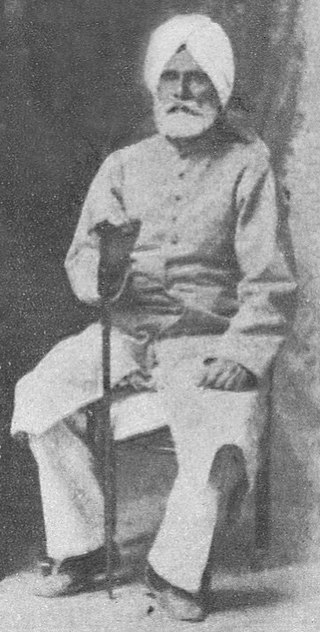
Altaf Hussain Hali, also known as Maulana Khawaja Hali, was an Urdu poet and writer.

Frank Bidart is an American academic and poet, and a winner of the Pulitzer Prize for Poetry.

Jean Garrigue was an American poet. In her lifetime, she received a Guggenheim Fellowship and a nomination for a National Book Award.
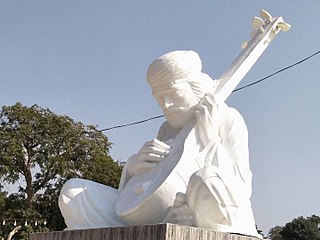
Shah Abdul Latif Bhittai, commonly known by the honorifics Lakhino Latif, Latif Ghot, Bhittai, and Bhit Jo Shah, was a Sindhi Sufi mystic and poet from Pakistan, widely considered to be the greatest poet of the Sindhi language.
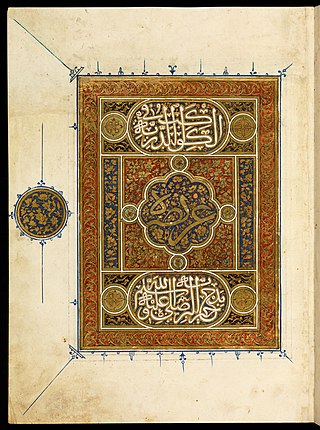
Qasīdat al-Burda, or al-Burda for short, is a thirteenth-century ode of praise for Muhammad composed by the eminent Shadhili mystic al-Busiri of Egypt. The poem, whose actual title is "The Celestial Lights in Praise of the Best of Creation", is famous mainly in the Sunni Muslim world. It is entirely in praise of Muhammad, who is said to have been praised ceaselessly by the afflicted poet, to the point that Muhammad appeared in a dream and wrapped him in a mantle or cloak; in the morning the poet discovers that God has cured him.

Strickland W. Gillilan (1869–1954) was an American journalist, author, poet, humorist and speaker. He is most famous for the poem The Reading Mother, which remains a popular poem on Mother's Day. He is also recognized as the author of Lines on the Antiquity of Microbes, said to be the shortest poem ever written. Much of his work is public domain and is often reproduced in greeting cards.

Aram Saroyan is an American poet, novelist, biographer, memoirist and playwright, who is especially known for his minimalist poetry, famous examples of which include the one-word poem "lighght" and a one-letter poem comprising a four-legged version of the letter "m".
Taha Muhammad Ali was a Palestinian poet.
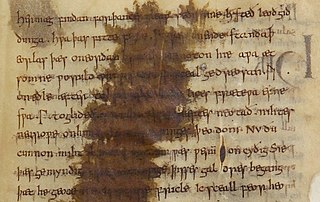
"The Fates of the Apostles" is the shortest of Cynewulf’s known canon at 122 lines long. It is a brief martyrology of the Twelve Apostles written in the standard alliterative verse. The Fates recites the key events that subsequently befell each apostle after the Ascension of Jesus. It is possible that The Fates was composed as a learning aid to the monasteries.

Meena Alexander was an Indian American poet, scholar, and writer. Born in Allahabad, India, and raised in India and Sudan, Alexander later lived and worked in New York City, where she was a Distinguished Professor of English at Hunter College and the CUNY Graduate Center.

Christ I is a fragmentary collection of Old English poems on the coming of the Lord, preserved in the Exeter Book. In its present state, the poem comprises 439 lines in twelve distinct sections. In the assessment of Edward B. Irving Jr, "two masterpieces stand out of the mass of Anglo-Saxon religious poetry: The Dream of the Rood and the sequence of liturgical lyrics in the Exeter Book ... known as Christ I".
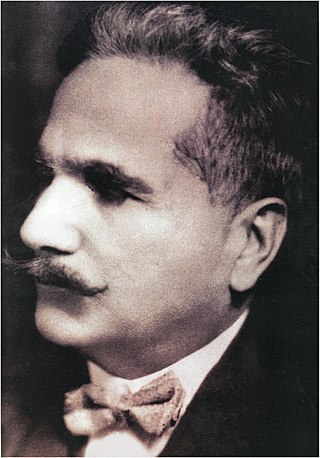
Sir Muhammad Iqbal was a South Asian Islamic philosopher, poet and politician. His poetry is considered to be among the greatest of the 20th century, and his vision of a cultural and political ideal for the Muslims of British-ruled India is widely regarded as having animated the impulse for the Pakistan Movement. He is commonly referred to by the honourific Allama and widely considered one of the most important and influential Muslim thinkers and Western religious philosophers of the 20th century.
References
- 1 2 Shapiro, Fred R. (2006). Yale Book of Quotations. Yale University Press. p. 310. ISBN 978-0-300-10798-2 . Retrieved 30 November 2015.
- ↑ Shackle, Eric. "The World's Shortest Poem". fun-with-words.com. Retrieved 25 June 2017.
- ↑ McDonell, Terry. "Muhammad Ali, Hunter S. Thompson, and George Plimpton: On the Literary Legacy of "The Champ"". The Hive. Retrieved 25 June 2017.
- ↑ Doherty, Richard J. (9 June 1975). "Professor Muhammed Ali Delivers Lecture; Poems and Parables Fill Talk on Friendship". The Harvard Crimson . Retrieved 30 November 2011.
- ↑ Schulian, John (2011) [1998]. "Ali! Ali! Ali!". Sometimes They Even Shook Your Hand: Portraits of Champions Who Walked Among Us. University of Nebraska Press. p. 305. ISBN 978-0803237766 . Retrieved 30 November 2015.
- ↑ Kanwar Dinesh Singh, New Explorations In Indian English Poetry, Sarup & Sons, 2004, pp.92-4